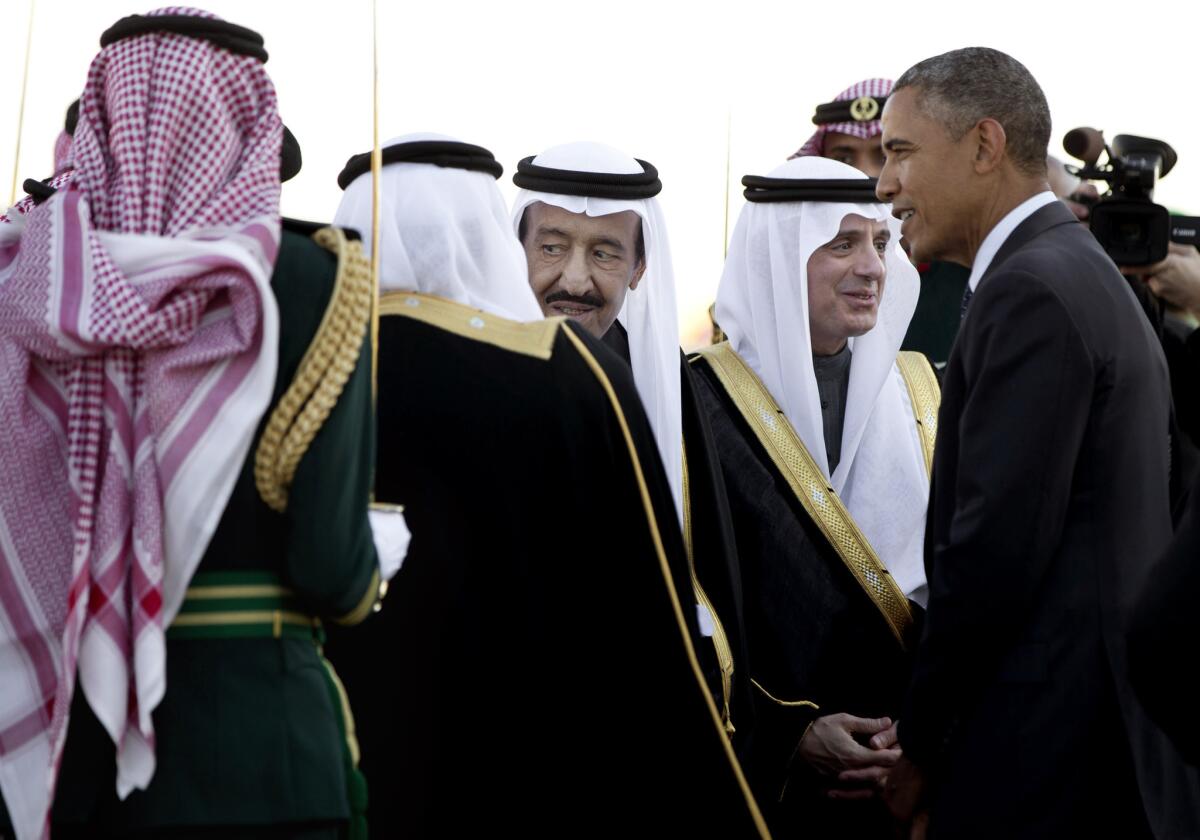Op-Ed: Go ahead, tick off the Saudis (and the Israelis, too)

President Obama is greeted by new Saudi King Salman bin Abdul Aziz in Riyadh in Janury. The Saudi king skipped this week’s summit at
- Share via
In his second term, President Obama has demonstrated a real knack for ticking off putative American friends. First, he annoyed Israeli Prime Minister Benjamin Netanyahu, who registered his complaint by promptly taking it to Capitol Hill. Now (apparently) he has irked Saudi Arabia’s King Salman, who signaled his unhappiness by skipping this week’s summit with gulf allies at Camp David.
The rocky turn in U.S. relations with two long-standing strategic partners has caused much hand-wringing. But is it really such a bad thing? Or does it hint at a long-overdue policy shift that will align U.S. commitments to these countries with actual American interests?
Obama has refused to defer to governments in the habit of expecting deference. Both Israel and Saudi Arabia have expressed alarm at the Obama administration’s pursuit of a nuclear deal with the Islamic Republic. Disregarding such concerns, Obama has forged ahead.
As others have noted, the nuclear negotiations are not really about nukes. The real aim of the talks is to end Iran’s diplomatic isolation, which dates to the Carter-era hostage crisis. Yet bringing Iran in from the cold will alter the strategic landscape in ways that Israel and Saudi Arabia find discomfiting. A completed deal will instantly transform Iran from a pariah into a major regional power. For existing regional powers, the result can mean only one thing: reduced room to maneuver.
Coming from a president not known for boldness, this strategy represents a very bold and indeed risky gambit. Two mutually reinforcing developments explain Obama’s willingness to take those risks.
First, longstanding U.S. policies are not working. American assertiveness, typically expressed in the use or threatened use of force, has not stabilized the Middle East. As for all the mumbo jumbo about spreading democracy and advancing the cause of human rights to transform the Islamic world, forget it.
Second, the circumstances that inspired those policies in the first place have ceased to exist.
The image of Israel as David encircled by hostile Arab Goliaths and therefore facing imminent extinction no longer conforms to the facts, if it ever did. That Israel still confronts threats to its security is doubtless true. Yet equally true is the fact that Israel exacerbates those threats through ill-advised actions such as settlement expansion in the West Bank and heavy-handed treatment of Palestinians. The U.S. commitment to ensure Israel’s right to exist is irrevocable. Why that commitment should extend to underwriting Israeli policies that then cause headaches for the United States elsewhere is no longer self-evident.
Similarly, the American way of life no longer depends on ensuring U.S. access to Persian Gulf oil. In 1980, Saudi Arabia appeared to be the world’s gas station. With North American oil and natural gas production booming, however, the United States has become its own gas station. The United States therefore need not turn a blind eye to Saudi actions — for example, underwriting radical Islamism — that eventually exact a toll in American blood and treasure.
It’s perfectly understandable that Israel and Saudi Arabia are pushing back against the shift that Obama is engineering. Both governments face an unwelcome choice: either accommodate changes in U.S. policy or look elsewhere for a patron or protector.
As a practical matter, however, viable alternatives to the United States are few in number and come with considerable disadvantages. In what some saw as a swipe at Washington, the Saudi-led Gulf Cooperation Council recently invited French President Francois Hollande to attend a GCC summit — the first such invitation ever extended to a Western leader. Does the Saudi royal family really want to entrust its fate to France? Does France even possess the wherewithal to assume that burden?
Scaremongers suggest that courting Iran implies a willingness to sell out Iran’s adversaries. In fact, the recalibration of relationships now underway points to something quite different: It holds out the prospect of putting U.S.-Israeli and U.S.-Saudi relations on a more businesslike footing.
Diplomacy is transactional. Successful diplomacy means striking the right balance between give and get. However belatedly, the Obama administration recognizes that when it comes to Israel and Saudi Arabia, the United States has done too much giving and too little getting while paying too high a price. Obama aims to fix that.
He may not succeed. But if he does, who cares if an Israeli prime minister and a Saudi monarch express a bit of pique?
Andrew J. Bacevich is writing a military history of America’s war for the greater Middle East.
Follow the Opinion section on Twitter @latimesopinion and Facebook
More to Read
A cure for the common opinion
Get thought-provoking perspectives with our weekly newsletter.
You may occasionally receive promotional content from the Los Angeles Times.






